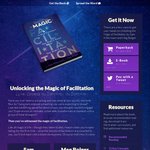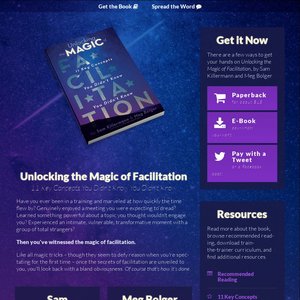FREE eBook (pay with a Tweet or a Facebook share), or you can also use pay-what-you-want via Gumroad instead of Twitter or Facebook share. Paperback is around $15 retail.
Have you ever been in a training and marvelled at how quickly the time flew by? Genuinely enjoyed a meeting you were expecting to dread? Learned something powerful about a topic you thought wouldn't engage you? Experienced an intimate, vulnerable, transformative moment with a group of total strangers?
Then you've witnessed the magic of facilitation.
Like all magic tricks – though they seem to defy reason when you're spectating for the first time – once the secrets of facilitation are unveiled to you, you'll look back with a bland obviousness. Of course that's how it's done.
In this book, co-authors and social justice facilitators Sam Killermann and Meg Bolger teach you how to perform the favorite tricks they keep up their sleeve. It's the learning they've accumulated from thousands of hours of facilitating, debriefing, challenging, and failing; it's the lessons from their mentors, channeled through their experience; it's the magician's secrets, revealed to the public, because it's about time folks have the privilege of looking behind the curtain of facilitation and thinking of course that's how it's done.
This book introduces and explains 11 key concepts every facilitator should know, that most facilitators don't even know they should know. They are sometimes-tiny things that show up huge in facilitation. It's a book for facilitators of all stripes, goals, backgrounds, and settings – and the digestible, enjoyable, actionable lessons would benefit anyone who is responsible for engaging a group of people in learning.
The 11 Key Concepts - You Didn't Know You Didn't Know:
Understanding Facilitation as a Nuanced Skill. Facilitation is…well…both nuanced and a skill: two things we don’t give it enough credit for being. In this chapter we’ll talk about why facilitation is a skill, who gets to identify as a facilitator, and the need to practice facilitation.
Facilitation vs. Teaching vs. Lecturing. Facilitation is a different style of engagement from teaching or lecturing. What makes it different? Why is that difference so important? What are things that we are giving up and gaining by choosing to facilitate?
Being Neutral. This chapter could also be called “Neutrality is non-existent” or “Neutrality: That would be nice, and so would Santa Claus.” Being a facilitator is not about being neutral, but instead about being honest and open with your group about your goals together, and recognizing the implicit bias in those goals.
How to Read a Group. Start by listening. Get to know them before they get in the room as much as possible, and then pay attention to what they are expressing and sharing in order to know where to go next. Groups are writing a lot about what they need; you just need to start reading.
Both/And is Greater than But/Or. The power of replacing but with “and” is incredible. Find out why in facilitation it can change how your participants respond and react and how you respond and react to them. Pulling ourselves out of the duality of either/or, the almighty “and” helps us see multiple realities as feasible and present.
The “Yes, and…” Rule. One of the foundational rules of improv has become one of our foundational concepts of facilitation. By adding to someone’s reality rather than negating it, you can often learn much more about a person’s perspective, understanding, and ideas, than any “no” could ever bring you.
Asking Good Questions. Good questions are more than just “open-ended” questions. Good facilitators ask good questions; great facilitators know how to do that every time. We cover what makes a good question, what kind of questions are out there to be asked, and what kind is best in what scenario.
Safe Spaces for Vulnerability. Facilitating can be challenging; showing up and really being seen while you’re facilitating can be even harder. We explore the impact of vulnerability on facilitation, and how courageous compassion is required to make a space where folks can learn from vulnerability.
Triggers. Not all experiences within a training are pleasant or wanted, and sometimes they leave our blood boiling and our heart racing. To be an effective facilitator, it’s our responsibility to manage our triggers, and we give you a model for doing just that.
Learning from Emotions. Emotions happen. As facilitators, we have a choice of whether to invite emotions into our trainings and what to do when they show up. We’ll explore how to make the most of those emotional moments, and the types of powerful learning available when you get ready to wrestle with emotions.
Role Modeling Continuous Learning (or The Myth of the Expert). We ask a lot of our participants, but perhaps nothing more important than being open to new learning. As a facilitator, we must lean into our own request, own our journeys, and role model the importance of saying, “I don’t know.”


After creating a FB post, it claimed it could not verify the post and so I didn't get to download. Tried a few times with the same result :(